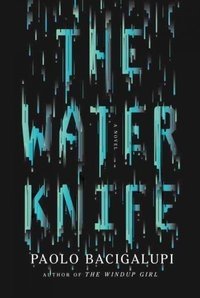Narrated by Almarie Guerra — In the American Southwest, the states of Nevada, Arizona, and California are battling over a dwindling water supply caused by climate change, population pressure, and brazen political brokering. States have declared their sovereignty, closed their borders, and guard them with armed militias that shoot to kill. Zoners (Arizonans) have few ways to make a living, and those with weapons prey on the desperate poor. To have water is to be rich.
“Water flows toward money,” the saying goes, and the wealthy have bought their way into ‘arcologies’ – high-rise buildings with complex ecosystems for recycling and recirculating virtually every drop of water. In Las Vegas, the Cypress arcologies were built by Catherine Case, nicknamed the Queen of the Colorado River, and head of the Southern Nevada Water Authority. Las Vegas is to some extent thriving, because of her cunning and cutthroat tactics. In Phoenix, the Chinese have built the Taiyang arcology, but most people are out of water and out of luck. Phoenix is dying.
Angel Velasquez, one of the book’s three protagonists, is an ex-prison inmate – smart, ruthless, a ‘water knife’ who works for Catherine Case, cutting other people’s water supplies. Lucy Monroe is a Phoenix-based Pulitzer Prize-winning journalist writing her stories and social media posts (#PhoenixDowntheTubes) who just might have a lead on some serious water rights. Maria Villarosa is a highly disposable Texas refugee barely surviving in Phoenix and at the constant mercy of a brutal gang headed by ‘the Vet’. People who get on the Vet’s really bad side are thrown to his pack of hyenas.
In the book’s opening sequence, clever legal maneuvering has stalled the filing of a water rights appeal, giving helicopters of the Nevada National Guard 12 hours to attack and destroy Carver City, Arizona’s water supply infrastructure- their community’s lifeline. And, with Angel in the unofficial lead, it does.
Before too much time passes, Angel, who has a boatload of false identities, visits Phoenix to investigate the mutilation death of one of Catherine Case’s undercover operatives, and the plot really starts to flow. He finds Phoenix swimming with Calis – Californians also working undercover to assure that state’s gluttonous water requirements are met, regardless of the needs of everyone upriver. Before long, all the players are after the same thing – the hint of original water rights documents that would supersede everything on the books – and no-one is sure who has them. Meanwhile, the fragility of the whole system is brought into sharp focus when someone starts blowing up the dams upstream.
This apocalyptic thriller is set in the not-too-distant future, and many of the seeds of the situations Bacigalupi describes are already planted in real life. He takes devastation already under way several steps farther, adds in toxic intergovernmental rivalries and a healthy dose of greed, and weaves them into an exciting, plausible, and thought-provoking tale. My only quibble is that the ‘escape fire‘ strategy Lucy uses at one point, which has been effective in fast-moving grasslands fires where there’s little fuel, is unlikely to work in a housing development – too much flammable material with slower burn rates. But that’s not an element critical to the story.
While the story is a critique of a governmental environment in which local interests are allowed to trump regional and federal ones, it never reads like a political tract. And, while quite a bit is imparted about the issue of water rights and reclamation strategies, it isn’t a legal or scientific one, either. It’s a thriller about a compelling trio of people with different motivations, different places in the water aristocracy, and different strategies for coping. The drought, dust, and poverty that envelop Angel, Lucy, and Maria and their cities affect everyone who lives there. Even the elites cloistered in the arcologies have not really escaped, just accommodated, for a time.
The universal catastrophe turns Maria’s musing about how this desperate situation came about into a powerful warning: “Somehow they hadn’t been able to see something that was plain as day, coming straight at them.”
Paolo Bacigalupi’s debut novel, The Windup Girl, won Hugo and Nebula Awards. Almarie Guerra, an actor born in Puerto Rico, does a solid narration, putting just the right Latino topspin on the Mexican voices.
Knopf
Audiobook/CD
£16.62
CFL Rating: 4 Stars










